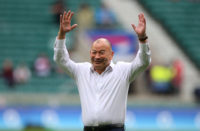 For the first time in a long while former Wales flanker Richard Parks will be sitting back next month and necking a few beers as he takes in as much Six Nations action as possible.
For the first time in a long while former Wales flanker Richard Parks will be sitting back next month and necking a few beers as he takes in as much Six Nations action as possible.
Usually this time of year he is bivouacking half way up a howling mountain face or dragging a sledge around remote polar regions – but this time around he intends to catch up with old rugby mates and let his broken body heal.
Parks, still only 36, is just back from the South Pole where he recorded the fastest ever unsupported coast to Pole trip by a British subject which, when you consider the stellar cast that preceded him – Scott, Shackleton, Wilson, Oats, Bowers, Evans et al – is some claim to fame. The 29-day 1,150km epic on skis and hauling his 250lb sledge came at a cost though, and as well as losing 12kg from his already spare frame, every joint in his body is still complaining loudly and demands nourishment and rest.
“That ability to just enjoy my rugby and the Six Nations as a fan now is quite closely connected to my new ‘career' as an extreme environment athlete,” says Parks. “When I was forced to retire from rugby I found it really difficult being around the game for a while. Now I love it again.”
In a career bedevilled by serious injury – fractured spine plus various serious knee and shoulder problems – Parks was to a degree the nearly man. Playing at various times for Pontypridd, Newport Gwent Dragons, Celtic Warriors, Leeds Rhinos and Perpignan, Parks won four Wales caps and played in the two warm-up internationals before the 2003 World Cup before being cut at the death by Steve Hansen. He never quit on his dreams but by 2009 he was no longer fit for purpose, a huge blow for an individual who prided himself on his supreme condition.
“I had given it everything. I never left anything on the pitch or on the training field and for a while, after the specialist gave me the verdict after my second shoulder operation I felt stunned and bitter. There was also the question of what the hell was I going to do next? I knew only rugby
“Then fates intervened. I had been reading Sir Ranulph Fiennes' book Mad, Bad and Dangerous to Know which was inspiring enough and I started meshing his exploits with a phrase or a quote that had resonated in the order of service at my grandmother's funeral.

“'The horizon is only the limit of our sight. I decided to get my body working again and although I might never be able to absorb the knocks of top grade rugby who knew what might lie over the horizon.
“I don't want to sound like a preacher here but rugby is such a fantastic occupation and lifestyle for preparing you for the next phase in your life. Don't squander it guys. It gives you so much. I am not surprised so many rugby players seem to be successful in other walks of life. It's so much more than just learning how to be fit, in fact that's the least of it. Rugby fitness is completely different to the fitness I need now, playing rugby I had to keep my muscle mass and weight up to absorb the knocks, now I'm looking for endurance and have shed stones of weight.
“No, what rugby does is teach you to take the knocks and keep coming back; it teaches you to plan and prepare but also to keep an open mind and react to what is going on around you; it teaches you the value of teamwork and camaraderie but also the need to make a few decisions of your own. In rugby you sometimes need a sense of humour or a sense of the ridiculous to get through the difficult days and sometimes you just need to show a bit of ticker and guts and again all of that is stuff I have found invaluable. It has certainly given me a heads up now.”
Parks still considers himself a professional athlete and trains like a maniac throughout the year when he is not in far flung places. His first self-appointed challenge after his retirement was his 737 project which involved climbing the highest mountains on the seven continents (if you include Antarctica) and reaching the magnetic North and South Poles inside seven months. He achieved that in just 213 days and since, with one or two diversions, he has been preoccupied with his goal of skiing to the South Pole.
Polar travel was once described by Apsley Cherry-Garrard – a colleague of Scott's on the 1910-12 expedition – as “the cleanest and most isolated way of having a bad time which has yet been devised” but Parks seems to flourish.
“It is genuinely humbling walking in the steps of some famous names and I particularly enjoyed the Welsh connection on this latest adventure. Edgar Evans from Rhossili was an unsung hero on the Scott trip, one of the five who walked to the Pole and then died on the return. Teddy Evans, the second in command of the whole project, raised a lot of the money and Wales generally got behind the trip which was seen as the equivalent of an Apollo moonshot in those days. The Terra Nova of course sailed from Cardiff and there is a museum there now.
“I admire both Scott and Roald Admundsen who beat him to the pole. I love Scott's stoicism and courage, his dragging rocks and specimens around when he was doomed and writing those moving diaries right to the end. But I also admire Admundsen's smash and grab raid. His game plan was perfect, in fact he made it look easy and believe me nothing is easy down there.”
Parks hasn't finished yet. He wants to become the first Brit to polish off the 148,000m mountains on the planet and then he has another big Polar adventure planned. But first a few Brains SA and dreams of what might have been on the rugby pitch.
BRENDAN GALLAGHER


























